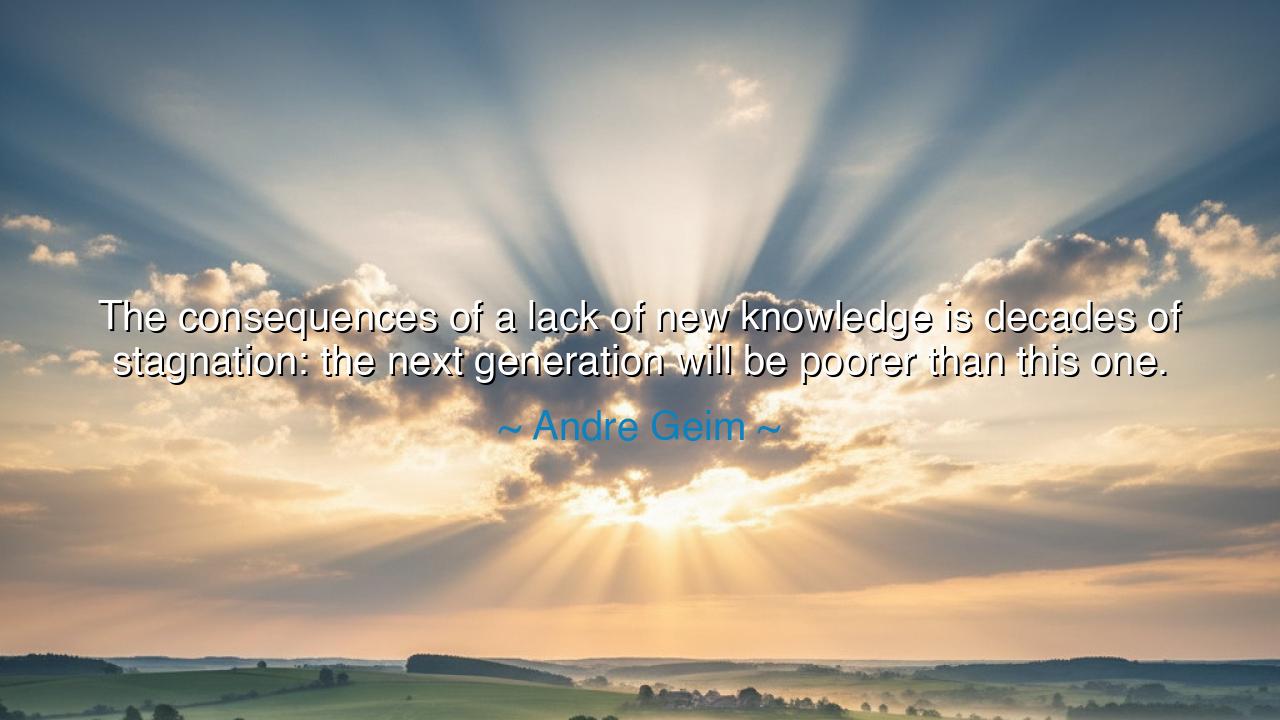
The consequences of a lack of new knowledge is decades of
The consequences of a lack of new knowledge is decades of stagnation: the next generation will be poorer than this one.






When Andre Geim, the Nobel laureate who discovered graphene, said, “The consequences of a lack of new knowledge is decades of stagnation: the next generation will be poorer than this one,” he spoke not merely as a scientist, but as a prophet of progress. His words carry the tone of warning and wisdom, echoing through time like the voice of an elder cautioning the young. In them lies the eternal truth that knowledge is the lifeblood of civilization, and that when humanity ceases to seek, it begins to decay. The quote reminds us that every discovery, every spark of curiosity, is a torch passed from one generation to the next. When that torch is allowed to dim, darkness follows.
Geim’s reflection is born from the crucible of experience — from his own journey through the world of science, where the pursuit of the unknown is both a burden and a blessing. He knew that societies often grow complacent in comfort, mistaking present success for eternal security. Yet knowledge, like a river, must flow or it will stagnate. When nations neglect research, when young minds are taught to obey rather than to wonder, the wealth of ideas dries up, and with it, the strength of the people. Thus, Geim’s words are not about science alone; they are a warning to every field, every soul that forgets the sacred duty of learning.
History bears witness to this truth. In the final centuries of the Roman Empire, luxury replaced curiosity, and power silenced philosophy. Once the center of knowledge, Rome forgot how to learn — and so it fell, not to armies alone, but to intellectual decay. Centuries later, Europe’s Renaissance was born from the rediscovery of forgotten wisdom — art, astronomy, mathematics — buried under the dust of apathy. Civilization was revived because a few dared to seek again. This pattern repeats across ages: when we abandon inquiry, the light fades; when we rekindle it, humanity rises anew.
The “decades of stagnation” Geim warns of are not merely economic but spiritual. A generation without discovery becomes a generation without dreams. When knowledge ceases to grow, the imagination withers, and progress turns to repetition. The young, who should have been explorers of new frontiers, instead inherit the stale air of yesterday’s complacency. Poverty of knowledge soon becomes poverty of opportunity, of courage, of meaning. For in truth, wealth is not measured in gold but in understanding — the power to shape one’s destiny through insight and invention.
Consider the tale of the Age of Exploration. Europe, having awakened from medieval darkness, sent ships across uncharted seas, not for conquest alone but for knowledge — to learn what lay beyond the horizon. It was a dangerous endeavor, yet it changed the world. So too did the Space Race of the 20th century, when humanity reached beyond its atmosphere and touched the stars. Both were born of curiosity, both expanded not just economies but the boundaries of human spirit. Had either era chosen comfort over curiosity, we would still be wondering what lies beyond our shores — and perhaps, beyond ourselves.
Geim’s warning is also deeply personal. It calls to every thinker, artist, and builder: never let the flame of inquiry die within you. For ignorance is not only the absence of knowledge but the rejection of wonder. To cease learning is to turn one’s back on life itself. Each mind, however small, is a universe capable of discovery; each question asked is a rebellion against stagnation. The next generation depends not on what we leave them in material wealth, but on whether we leave them the spirit to question, to experiment, to dream.
The lesson, therefore, is both urgent and sacred: nurture curiosity. Defend the institutions of learning as one would defend a temple. Encourage exploration not only in laboratories but in every heart. Let every parent, teacher, and leader understand that knowledge is the truest inheritance humanity can give. A nation that honors its thinkers sows prosperity for centuries; one that silences them condemns its children to poverty of mind and soul.
And so, as the ancients would say, “Guard the flame.” Do not allow it to be smothered by fear, indifference, or greed. For in that flame — the eternal pursuit of new knowledge — lies the power to lift generations out of shadow. When we learn, we rise. When we stop, we sink. May Andre Geim’s words echo in every hall of learning, in every home, in every mind: knowledge is life, and without it, the future will grow dim.






AAdministratorAdministrator
Welcome, honored guests. Please leave a comment, we will respond soon